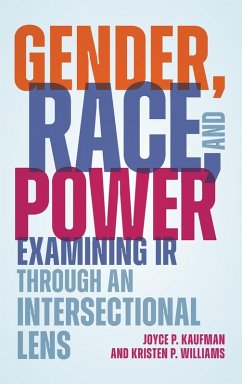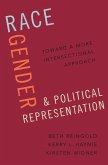Joyce P. Kaufman, Kristen P. Williams
Gender, Race, and Power
Examining IR through an Intersectional Lens
Joyce P. Kaufman, Kristen P. Williams
Gender, Race, and Power
Examining IR through an Intersectional Lens
- Gebundenes Buch
- Merkliste
- Auf die Merkliste
- Bewerten Bewerten
- Teilen
- Produkt teilen
- Produkterinnerung
- Produkterinnerung
This book interrogates traditional international relations theories and issues, such as war, peace, security, and trade, to demonstrate that a more comprehensive and holistic understanding can be found utilizing an intersectional analysis through the lens of gender, race, and class.
Andere Kunden interessierten sich auch für
![Gender, Race, and Power Gender, Race, and Power]() Joyce P. KaufmanGender, Race, and Power40,99 €
Joyce P. KaufmanGender, Race, and Power40,99 €![Race, Gender, and Culture in International Relations Race, Gender, and Culture in International Relations]() Race, Gender, and Culture in International Relations180,99 €
Race, Gender, and Culture in International Relations180,99 €![Race, Gender, and Political Representation Race, Gender, and Political Representation]() Beth ReingoldRace, Gender, and Political Representation54,99 €
Beth ReingoldRace, Gender, and Political Representation54,99 €![Gender, Race, and Office Holding in the United States Gender, Race, and Office Holding in the United States]() Becki ScolaGender, Race, and Office Holding in the United States199,99 €
Becki ScolaGender, Race, and Office Holding in the United States199,99 €![Culture, Gender, Race, and U.S. Labor History Culture, Gender, Race, and U.S. Labor History]() Culture, Gender, Race, and U.S. Labor History91,99 €
Culture, Gender, Race, and U.S. Labor History91,99 €![Gender, Race, and Office Holding in the United States Gender, Race, and Office Holding in the United States]() Becki ScolaGender, Race, and Office Holding in the United States58,99 €
Becki ScolaGender, Race, and Office Holding in the United States58,99 €![Islamophobia, Race, and Global Politics Islamophobia, Race, and Global Politics]() Nazia KaziIslamophobia, Race, and Global Politics43,99 €
Nazia KaziIslamophobia, Race, and Global Politics43,99 €-
-
-
This book interrogates traditional international relations theories and issues, such as war, peace, security, and trade, to demonstrate that a more comprehensive and holistic understanding can be found utilizing an intersectional analysis through the lens of gender, race, and class.
Hinweis: Dieser Artikel kann nur an eine deutsche Lieferadresse ausgeliefert werden.
Hinweis: Dieser Artikel kann nur an eine deutsche Lieferadresse ausgeliefert werden.
Produktdetails
- Produktdetails
- Verlag: Rowman & Littlefield Publishers
- Seitenzahl: 188
- Erscheinungstermin: 15. Oktober 2024
- Englisch
- Abmessung: 235mm x 157mm x 15mm
- Gewicht: 431g
- ISBN-13: 9781538182116
- ISBN-10: 1538182114
- Artikelnr.: 70832217
- Herstellerkennzeichnung
- Libri GmbH
- Europaallee 1
- 36244 Bad Hersfeld
- gpsr@libri.de
- Verlag: Rowman & Littlefield Publishers
- Seitenzahl: 188
- Erscheinungstermin: 15. Oktober 2024
- Englisch
- Abmessung: 235mm x 157mm x 15mm
- Gewicht: 431g
- ISBN-13: 9781538182116
- ISBN-10: 1538182114
- Artikelnr.: 70832217
- Herstellerkennzeichnung
- Libri GmbH
- Europaallee 1
- 36244 Bad Hersfeld
- gpsr@libri.de
By Joyce P. Kaufman and Kristen P. Williams
List of Text Boxes
Preface
List of Abbreviations
Introduction
Chapter 1: Intersectionality and IR
Introduction: Starting with the War in Ukraine
Intersectionality and IR
Mainstream IR Theories: Realism, Liberalism, and Constructivism
Critiques of Mainstream IR: Race, Gender, and Empire-and Intersectionality
Conclusion: Overview of Chapters 2-6
Chapter 2: Intersectionality and Issues of War, Peace, and Security
Introduction
What is War?
What is Peace?
War and Peace from an Intersectional Perspective: Human Security
The Women, Peace, and Security Agenda and UNSCR 1325
Critiques of UNSCR 1325: Intersectionality Matters
Intersectional Analysis: Northern Ireland as a Case Study
Conclusion
Chapter 3: Intersectionality, Human Rights, and Humanitarian Intervention
Introduction
Human Rights as a Concept and a Norm
Women and Their Impact on the UN Charter and UDHR
UDHR and Human Rights from an Intersectional Perspective
Applying an Intersectional Analysis: CEDAW as a Case Study
Humanitarian Intervention and the Responsibility to Protect (R2P)
Conclusion
Chapter 4: Intersectionality, the Global Economy, and Issues of Development
Introduction
IR Approaches to the Global Economy
Gendering Development: WID, WAD, and GAD
Global Health and Economic Development: COVID-19 as a Case Study
Conclusion
Chapter 5: Intersectionality and the Environment
Introduction
Development and Evolution of International Environmental Politics
International Relations and the Environment
Intersectionality and International/Global Environmental Politics
Case Study: Intersectionality and Climate Change
Gendering Climate Change and Global Governance
Conclusion
Chapter 6: Examining IR from an Intersectional Perspective: Lessons Learned
Introduction
Answering the Questions
Intersectionality and the Case Studies
Conclusion: The Challenges and Possible Next Steps
Glossary
About the Authors
Preface
List of Abbreviations
Introduction
Chapter 1: Intersectionality and IR
Introduction: Starting with the War in Ukraine
Intersectionality and IR
Mainstream IR Theories: Realism, Liberalism, and Constructivism
Critiques of Mainstream IR: Race, Gender, and Empire-and Intersectionality
Conclusion: Overview of Chapters 2-6
Chapter 2: Intersectionality and Issues of War, Peace, and Security
Introduction
What is War?
What is Peace?
War and Peace from an Intersectional Perspective: Human Security
The Women, Peace, and Security Agenda and UNSCR 1325
Critiques of UNSCR 1325: Intersectionality Matters
Intersectional Analysis: Northern Ireland as a Case Study
Conclusion
Chapter 3: Intersectionality, Human Rights, and Humanitarian Intervention
Introduction
Human Rights as a Concept and a Norm
Women and Their Impact on the UN Charter and UDHR
UDHR and Human Rights from an Intersectional Perspective
Applying an Intersectional Analysis: CEDAW as a Case Study
Humanitarian Intervention and the Responsibility to Protect (R2P)
Conclusion
Chapter 4: Intersectionality, the Global Economy, and Issues of Development
Introduction
IR Approaches to the Global Economy
Gendering Development: WID, WAD, and GAD
Global Health and Economic Development: COVID-19 as a Case Study
Conclusion
Chapter 5: Intersectionality and the Environment
Introduction
Development and Evolution of International Environmental Politics
International Relations and the Environment
Intersectionality and International/Global Environmental Politics
Case Study: Intersectionality and Climate Change
Gendering Climate Change and Global Governance
Conclusion
Chapter 6: Examining IR from an Intersectional Perspective: Lessons Learned
Introduction
Answering the Questions
Intersectionality and the Case Studies
Conclusion: The Challenges and Possible Next Steps
Glossary
About the Authors
List of Text Boxes
Preface
List of Abbreviations
Introduction
Chapter 1: Intersectionality and IR
Introduction: Starting with the War in Ukraine
Intersectionality and IR
Mainstream IR Theories: Realism, Liberalism, and Constructivism
Critiques of Mainstream IR: Race, Gender, and Empire-and Intersectionality
Conclusion: Overview of Chapters 2-6
Chapter 2: Intersectionality and Issues of War, Peace, and Security
Introduction
What is War?
What is Peace?
War and Peace from an Intersectional Perspective: Human Security
The Women, Peace, and Security Agenda and UNSCR 1325
Critiques of UNSCR 1325: Intersectionality Matters
Intersectional Analysis: Northern Ireland as a Case Study
Conclusion
Chapter 3: Intersectionality, Human Rights, and Humanitarian Intervention
Introduction
Human Rights as a Concept and a Norm
Women and Their Impact on the UN Charter and UDHR
UDHR and Human Rights from an Intersectional Perspective
Applying an Intersectional Analysis: CEDAW as a Case Study
Humanitarian Intervention and the Responsibility to Protect (R2P)
Conclusion
Chapter 4: Intersectionality, the Global Economy, and Issues of Development
Introduction
IR Approaches to the Global Economy
Gendering Development: WID, WAD, and GAD
Global Health and Economic Development: COVID-19 as a Case Study
Conclusion
Chapter 5: Intersectionality and the Environment
Introduction
Development and Evolution of International Environmental Politics
International Relations and the Environment
Intersectionality and International/Global Environmental Politics
Case Study: Intersectionality and Climate Change
Gendering Climate Change and Global Governance
Conclusion
Chapter 6: Examining IR from an Intersectional Perspective: Lessons Learned
Introduction
Answering the Questions
Intersectionality and the Case Studies
Conclusion: The Challenges and Possible Next Steps
Glossary
About the Authors
Preface
List of Abbreviations
Introduction
Chapter 1: Intersectionality and IR
Introduction: Starting with the War in Ukraine
Intersectionality and IR
Mainstream IR Theories: Realism, Liberalism, and Constructivism
Critiques of Mainstream IR: Race, Gender, and Empire-and Intersectionality
Conclusion: Overview of Chapters 2-6
Chapter 2: Intersectionality and Issues of War, Peace, and Security
Introduction
What is War?
What is Peace?
War and Peace from an Intersectional Perspective: Human Security
The Women, Peace, and Security Agenda and UNSCR 1325
Critiques of UNSCR 1325: Intersectionality Matters
Intersectional Analysis: Northern Ireland as a Case Study
Conclusion
Chapter 3: Intersectionality, Human Rights, and Humanitarian Intervention
Introduction
Human Rights as a Concept and a Norm
Women and Their Impact on the UN Charter and UDHR
UDHR and Human Rights from an Intersectional Perspective
Applying an Intersectional Analysis: CEDAW as a Case Study
Humanitarian Intervention and the Responsibility to Protect (R2P)
Conclusion
Chapter 4: Intersectionality, the Global Economy, and Issues of Development
Introduction
IR Approaches to the Global Economy
Gendering Development: WID, WAD, and GAD
Global Health and Economic Development: COVID-19 as a Case Study
Conclusion
Chapter 5: Intersectionality and the Environment
Introduction
Development and Evolution of International Environmental Politics
International Relations and the Environment
Intersectionality and International/Global Environmental Politics
Case Study: Intersectionality and Climate Change
Gendering Climate Change and Global Governance
Conclusion
Chapter 6: Examining IR from an Intersectional Perspective: Lessons Learned
Introduction
Answering the Questions
Intersectionality and the Case Studies
Conclusion: The Challenges and Possible Next Steps
Glossary
About the Authors









